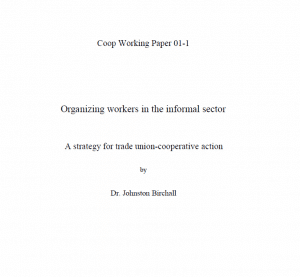
Policy highlights:
- Informal sector workers face a number of constraints, such as low income, lack of job security and legal protection, lack of access to markets, training and material, and no voice in politics. Women’s needs in the informal sector are particularly urgent.
- It is possible to maximize both the employment-creating potential of the informal sector as well as the degree of social protection and regulation extended to it by promoting associations that have features of both cooperatives and trade unions.
- In order to achieve both objectives a joint and multi-levelled strategy is needed to involve all relevant international, national, regional and local actors in the process.
- There are definite limits to joint action, especially in issues such as social security, health and safety, and provision of land rights and infrastructure. In these fields unions and cooperatives can be pressure groups, but success depends on efforts by other agencies such as local governments, health workers, employer organizations and NGOs.










